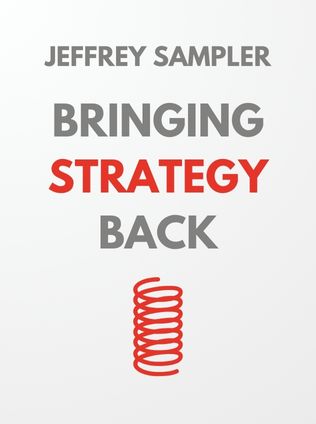
Bringing Strategy Back
How Strategic Shock Absorbers Make Planning Relevant in a World of Constant Change
By Jeffrey Sampler
Published 12/2014
About the Author
Jeffrey Sampler is an adjunct professor of strategy and technology at China Europe International Business School. His research interests include the strategic implications of new technology and the management of information as a strategic resource. He has been featured in Newsweek, BBC Television, CNBC, Economic Times, and Financial Mail. Sampler’s work is distinguished by its deep dives into the nuances of strategic planning in volatile and rapidly evolving markets, drawing from his extensive research and practical insights.
Main Idea
In "Bringing Strategy Back: How Strategic Shock Absorbers Make Planning Relevant in a World of Constant Change," Jeffrey Sampler addresses the inadequacies of traditional strategic planning tools in today’s fast-paced, unpredictable business environment. He introduces the concept of "Strategic Shock Absorbers"—Accuracy, Agility, Momentum, and Foresight—as mechanisms that enable organizations to absorb shocks and maintain operational speed without destabilizing. This approach ensures that strategic planning is not merely reactive but proactive and preemptive, allowing businesses to thrive amidst continuous change.
Table of Contents
- Introduction
- Strategic Shock Absorbers
- Accuracy: Creating Order and Transparency
- Agility: Seizing and Repeating Opportunities
- Momentum: Speeding Past Shocks and Surprises
- Foresight: Getting Ahead of Change and Chaos
- Execution: Shock Absorbers in Action
- Driven by Values
- Management Innovation from Fast-Moving Markets
Introduction
In today’s business landscape, the pace of change is relentless. The five-year strategic planning horizon, once a staple of corporate strategy, is now often impractical. Traditional strategic tools fail to keep up with rapidly closing windows of opportunity, uneven growth rates, and asymmetric competition. Sampler argues that what is needed is a strategic framework that absorbs shocks and surprises efficiently, ensuring that strategic planning remains relevant and actionable. This framework is built on four Strategic Shock Absorbers: Accuracy, Agility, Momentum, and Foresight. These elements work together to help organizations navigate and thrive amidst global turbulence.
Strategic Shock Absorbers
Just as cars need shock absorbers to maintain speed and stability on rough roads, businesses need mechanisms to handle unexpected changes without losing momentum. Sampler introduces four Strategic Shock Absorbers that provide the necessary resilience:
- Accuracy: Delivers on-target forecasting and enables granularity and specificity.
- Agility: Provides speed and flexibility in strategic options.
- Momentum: Ensures continuity and minimizes disruption.
- Foresight: Enhances capability for sense-making and scanning the external environment.
Accuracy: Creating Order and Transparency
Accuracy in strategic planning means having a clear understanding of both internal capabilities and the external competitive environment. It involves precise forecasting and detailed awareness, enabling organizations to identify and capitalize on growth opportunities while addressing performance gaps. Tools such as decision triggers, management by majlis, and developing strategic wedges are crucial for achieving accuracy.
Sign up for FREE and get access to 1,400+ books summaries.
You May Also Like
Rich Dad Poor Dad
What the Rich Teach Their Kids About Money - That the Poor and Middle Class Do Not!
By Robert T. KiyosakiFreakonomics
A Rogue Economist Explores the Hidden Side of Everything
By Steven D. Levitt and Stephen J. DubnerThe Lean Startup
How Today's Entrepreneurs Use Continuous Innovation to Create Radically Successful Businesses
By Eric RiesWho Moved My Cheese?
An Amazing Way to Deal with Change in Your Work and in Your Life
By Spencer Johnson, M.D.Factfulness
Ten Reasons We're Wrong About the World – and Why Things Are Better Than You Think
By Hans RoslingMake Your Bed
Little Things That Can Change Your Life...And Maybe the World
By William H. McRaven



















